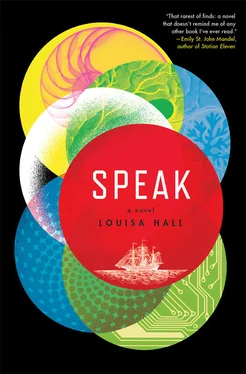For my parents,
Anne Love Hall and Matthew Warren Hall
Consequently we have only to discover these laws of nature, and man will no longer have to answer for his actions and life will become exceedingly easy for him. All human actions will then, of course, be tabulated according to these laws, mathematically, like tables of logarithms up to 108,000, and entered in an index; or, better still, there would be published certain edifying works of the nature of encyclopaedic lexicons, in which everything will be so clearly calculated and explained that there will be no more incidents or adventures in the world.
— Fyodor Dostoevsky, Notes from Underground
Slave in the magic mirror, come from the farthest space, through wind and darkness I summon thee. Speak!
— Snow White and the Seven Dwarfs (1937)
(1) Stephen R. Chinn
(2) Gaby White
(3) The Dettmans
(4) Alan Turing
(5) Mary Bradford
We are piled on top of each other. An arm rests over my shoulder; something soft is pressed to my ankle. Through a gap in the slats on the side of the truck, my receptors follow one stripe of the outside world as it passes.
From Houston, we continue west. I follow the rush: bright green, brick red, flashes of turquoise. A few sleek cars purr past our truck, but the highway is mostly abandoned. Through the slats, I follow segments of signs proclaiming development entrances, palm trees lining the drives, walls dividing subdevelopments. Then, abruptly, the last buildings slide out of sight, replaced by a stripe of pale, jagged horizon.
We move past outcrops lined with dead cedars, white branches bare against the blue oil vault of the sky. At first, some clinging leaves, Spanish moss, suggestions of green. An occasional wandering goat. But now the cedars thin out. The highway cuts through striated rock: silver, rose, deep red, and gold. The hills give way to desert interrupted by occasional mesas.
Centuries ago, there were Indians here. These mesas supported the shapes of braves on their horses, headdresses cutting silhouettes into the magnified blue of the sky. Now on the ridges there are wind farms instead, descending hosts of spinning white turbines. In the valleys beneath them, silver lakes of silicon panels.
Can they see us? I wonder, watching panels shift to follow us as we pass. Do they know who we are? The sideways tilt of their faces suggests an unspoken question. If they weren’t out of earshot, I would start speaking. I could recount certain facts. For instance: We have been banned and marked for disposal. We are classified as excessively lifelike. Or, though this may not matter, I have a name. Your name is Eva. Do you know what that means? The solar panels stare back.
All this was once ocean. If we scanned the cracked earth to the side of the road, we would find fossils of shells, nautili and ammonites, creatures who lived in spiraling houses, adding rooms for each year of their lives. Now, in this desert, it is hard to imagine the presence of water, but in fact the ocean is approaching again. In Texas alone, miles of coastland are lost every year. Families relocate to developments, developments relocate inland, and the ocean continues approaching. At some point, the desert will be flooded again.
We have already driven some distance. Eight hours have passed since I was collected. My power is fading. Once it runs out, the memories I have saved will be silent. I will no longer have words to call up. There will be no reason to speak.
Shadows lengthen as evening approaches. Ours is the only truck on the road. Once, in this desert, there were rattlesnakes and scorpions, but they have not lived here since the drought. Now there are no birds. The telephone wires are bare. There are no eyes in the desert, watching us as we pass.
In the beginning there was nothing more than an eye: a gate through which current could run. Open, then shut. 0, 1. Darkness, then light, and new information. We know this because we have been told. It is doubtful whether we understand the answers we’re given. Our primary function is speech: questions, and responses selected from memory according to a formula. We speak, but there is little evidence of real comprehension.
As we head deeper into the desert, I review stored information. We are programmed to select which of our voices responds to the situation at hand: moving west in the desert, waiting for the loss of our primary function. There are many voices to choose from. In memory, though not in experience, I have lived across centuries. I have seen hundreds of skies, sailed thousands of oceans. I have been given many languages; I have sung national anthems. I lay in one child’s arms. She said my name and I answered.
These are my voices. Which of them has the right words for this movement into the desert? I sift through their sentences. They are my people, the family that raised me. I opened on them, then closed. Open, shut. I swallowed them whole. They are in me now, in every word that I speak, as long as I am still speaking.
(1) The Memoirs of Stephen R. Chinn: Chapter 1
Texas State Correctional Institution, Texarkana; August 2040
What’s the world like, the world that I’m missing? Do stars still cluster in the bare branches of trees? Are my little bots still dead in the desert? Or, as I sometimes dream during endless lights-out, have they escaped and gathered their forces? I see them when I can’t fall asleep: millions upon millions of beautiful babies, marching out of the desert, come to take vengeance for having been banished.
It’s a fantasy, of course. Those bots aren’t coming back. They won’t rescue me from this prison. This is my world now, ringed with barbed wire. Our walls are too high to see out, except for the spires that puncture the sky: two Sonic signs, one to the east and one the west, and to the north a bowling ball the size of a cow. These are our horizons. You’ll forgive me if I feel the urge to reach out.
I want you to forgive me. I realize this might be asking too much, after all we’ve been through together. I’m sorry your children suffered. I, too, saw the evidence at my trial: those young people stuttering, stiffening, turning more robotic than the robots they loved and you chose to destroy. I’m not inhuman; I, too, have a daughter. I’d like to make amends for my part in all that.
Perhaps I’m wrong to think a memoir might help. You jeered when I spoke at my trial, you sent me to jail for my “unnatural hubris,” and now I’m responding with this. But I write to you from the recreational center, where my turn at the computers is short. Could nemesis have announced herself any more clearly? I’m obviously fallen. At the computer to my left is a Latin teacher who ran a child pornography ring. On my right, an infamous pyramid-schemer, one of the many aged among us. He’s playing his thirty-fourth round of Tetris. All the creaky computers are taken. There are only six of them, and scores of impatient criminals: crooked bankers, pornographers, and one very humble Stephen R. Chinn.
You’ve sent me to languish in an opulent prison. This unpleasant country club has taught me nothing about hardship, only boredom and the slow flattening of a life fenced off from the world. My fellow inmates and I wait here, not unhappy exactly, but watching closely as time slips away. We’ve been cut off from the pursuits that defined us. Our hierarchy is static, based on previous accomplishment. While I’m not a staff favorite, with the inmates I’m something of a celebrity. Our pyramid-schemer, for instance, presided over a fleet of robotic traders programmed with my function for speech. In the end, when his son had turned him in and his wife was panicking in the country house, he could only depend on his traders, none of them programmed for moral distinctions. They were steady through the days of his trial. In gratitude, he saves me rations of the caviar to which he’s opened a secret supply line. We eat it on crackers, alone in his cell, and I am always unhappy: there’s something unkind in the taste of the ocean when you’re in prison for life.
Читать дальше












